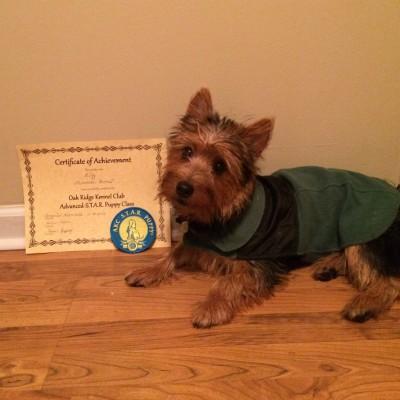Mary McNeight, CPDT-KA, CCS, BGS Director of Training and Behavior Service Dog Academy - www.servicedogacademy.com Diabetic Alert Dog University - www.diabeticalertdoguniversity.com
We train Diabetic Alert Dogs. See our recent interview on New Day Northwest! Follow us on Facebook!
Two Diabetic Alert Dog University students waiting patiently for their food puzzle toys and for their Pogo Plush Bunny (used to teach the dogs to play tug and to share toys.)
Seattle, Washington has a unique brand of dog trainer at Service Dog Academy. Nowhere else in the Pacific Northwest can people with diabetes learn to train their dogs to alert to blood sugar imbalances. As a part of Service Dog Academy staff, we work hard to get this highly specialized training to more and more people each day.
Our dog training studio was founded on the principles that people with disabilities should have affordable resources to live a manageable, independent life, and to us that means being able to train your own service dog. Having first-hand experiences with hypoglycemia and type-2 diabetes, Mary McNeight, CPDT-KA, head trainer and founder knows that manageability means a lot to those seeking out a diabetic alert dog.
The costs of insurance, medicals services, and peace of mind that they won’t pass out in a shopping mall only to wake up with emergency personnel at their side is worth the work it takes to have a canine companion on the ready to alert when blood sugar starts to drop. As part of her diabetic alert dog training methods, Premier puzzles are a main part of the work to eat strategy. In the wild, dogs had to work for hours on end to find their food, and with a work to eat strategy, it emulates this as best as we can. Here's why we love this method:
- You get a dog that thinks you’re the coolest thing since sliced bread. When your dog feels this way, he'll do what it takes to get your attention, never be far from your side, and for a medical alert assistance dog, a trait you can't live without.
- What happens when you get frustrated? The inclination to give-up - and just like you and me, Fido can feel frustrated, too. Puzzles create frustration tolerance. We want our diabetic alert dogs to try over and over and over again to get your attention, and tolerate a little frustration.
Citka, a 1 1/2 year old Golden Retriever and graduate of the program, jumped on a fabric store cutting counter to get his owner's attention when her blood sugar was crashing; Buddy, a one-year old black lab was behind a closed door when his owner passed out, so the puppy who barely ever barked before howled at the top of his lungs to get anyone's attention. We're proud of our thinking dogs, dogs who don't take "no" for an answer!
- Your dog gets vigorous mental exercise that is the equivalent of a 10-minute walk. Something that is quite valuable to a person who is disabled and/or wheelchair bound - and pretty nice overall on those cold and rainy days when neither of you feel like being outside for those treks.
Click Here to watch a video of a group of Diabetic Alert Dogs playing a game of tug with a Pogo Plush Rabbit! At our train-your-own diabetic alert dog program and now recently launched online diabetic alert dog video training program at Diabetic Alert Dog University, we see dogs of all different shapes and sizes come into class, and some may have been using work to eat strategies since birth, and others might not be as proficient. We need puzzles to match that diversity.
Thank goodness for Premier's line of customizable puzzles that are made for every dog from purse pooches to Great Danes. The range of levels from easy to hard are one feature, but we found that complexity can be added to each one just by adding a part - for example, Linkables have lots of opportunity to throw in a curveball for those genius dogs, or you could add a ball to the Tug A Jug. And for excessive chewers or apartment dwellers who need a quieter toy, there is something for both puppies and adult dogs in the Premier line of work to eat puzzles.
An estimated 25.8 million people in the United States are affected by diabetes whether diagnosed or not, according to the CDC. All those people seeking medical help cost the American health care system nearly double the cost of a world without diabetes. As the 6th most common disability among U.S. adults, it causes quite a strain on the economy, and the need for preventative measures is dire. While we don't have the resources to cure diabetes, Service Dog Academy and Diabetic Alert Dog University strive to create a system that makes living with diabetes much more manageable, cuts down on trips to the emergency room, and Premier work-to-eat puzzles are a huge part of it!
Article written by Carrie Rubens and Mary McNeight




